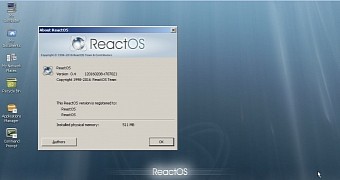ReactOS developer Ziliang Guo announced on February 16, 2016, the immediate availability for download of the ReactOS 0.4.0 open-source operating system that clones the design principles for Microsoft Windows NT's architecture.
It has been ten long years since the release of ReactOS 0.3.0 back in 2006, and the development team is proud to announce today that the development team managed to add both user- and developer-centric improvements, besides the usual bug fixing and code cleanups.
For users, ReactOS 0.4.0 brings support for reading NTFS filesytems, support for reading and writing EXT2 filesystems, support for a new explorer theme and shell, SerialATA support, sound and USB support, wireless networking, as well as VirtualPC and VirtualBox support.
On the other hand, developers can find features like CMake support for Microsoft Visual C++ (MSVC) and GCC (GNU Compiler Collection) compilation, WinDBG support, greatly improved compilation times, and a GDB (The GNU Project Debugger) remote debugging interface that they can use for kernel debugging.
"The 0.4.0 release is dedicated to the memory of Gé van Geldorp and Brandon Mark Turner, two ReactOS members who sadly passed away, and we hope that its fruition will serve to show at least some degree of our immense gratitude for the effort they put into this project," reads today's announcement.
Not a Linux distribution
There are numerous other new features implemented in the major 0.4.0 release of ReactOS, such as graphics stack improvements, significant updates to the memory manager, better networking, support for 16-bit DOS applications, support for booting Windows 2003 using ReactOS’ bootloader, and much more.
As always, ReactOS 0.4.0 is available for download for free, as both Live CD and BootCD ISO images, as well as VMWare and QEMU appliances from the project's website. Please note that ReactOS is not a Linux kernel-based operating system, and it borrows none of the functionalities of the UNIX architecture.

 14 DAY TRIAL //
14 DAY TRIAL //